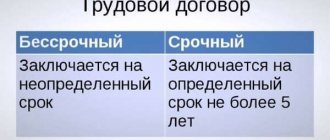An employment contract is an agreement between an employee and an employer. Anyone can act as an employer:
- Organizations;
- Enterprises;
- Individual people.
Labor relations have their own specifics and differ from the usual contracts that are signed among themselves, including citizens and organizations.
Labor relations can also arise on a temporary basis:
- The contract is signed for a clearly defined time (seasonal work in agriculture);
- The duration of the contract depends on the circumstances (an employee who returned to work before the end of maternity leave).
The contract is signed for an indefinite period and is not limited in advance. Its termination can occur at any time, both due to the wishes of the parties and for reasons beyond their influence. The groups of grounds for termination of employment relations are listed in detail in the law, and no one has the right to go beyond these limits.
In the usual sense, an agreement is signed on one or several sheets, the signatures of the parties are placed at the end, and the document lists their rights and obligations. This should happen with employment contracts, but often the employee simply makes a special entry in the work book, or even signs a contract agreement, but in fact the person is in the position of an employee.
Be that as it may, the employee and employer have the same rights as if an employment contract had been signed in accordance with the standard form.
Separately, situations are considered when labor contracts are signed with employees, which are a special type of employment contract. The contract is allowed only for certain categories of workers specified in the law; signing it with those who are not included in this list is prohibited and illegal. The contract is usually fixed-term and is signed for a specific time, although it can be extended.
Features of an open-ended employment contract
What are these features:
- Constant need for an employee of some category or with some skills;
- There are no restrictions on the duration of the contract (it is assumed that a person can work in his place for his entire working life);
- Responsibilities and the possibility of changing them in terms of increasing them are specified in more detail.
If a person is hired for a temporary job, then the scope of responsibilities is often small; something needs to be done that will not be permanently needed, but concluding an agreement with an entrepreneur or commercial structure is problematic.
As an example, the law provides installation work and other activities related to the expansion of the organization’s activities. The work must be clearly temporary. In practice, there are cases when an enterprise is created to implement one project; government projects are no exception.
An exception is the occupation of a position during maternity leave or in other cases when a full-fledged replacement is needed for a certain period.
The law clearly states that seasonal work is related to natural cycles . Temporary work is limited to a period of 2 months, if this wording is used when hiring a person without additional reservations.
If there is no separate clause in the documents or application, according to the law the person was hired for an indefinite period. At the same time, there is a separate article listing types of work that are urgent or temporary.
With an open-ended contract, it is necessary to stipulate:
- vacation issues;
- changes in work schedule;
- bonuses, changes in the amount of payment;
- career opportunities.
These issues are also raised in the case of temporary workers, but not always and not to the same extent.
Open-ended or fixed-term employment contract: in what cases to conclude
As a general rule, the company enters into an open-ended employment contract with a new employee.
But sometimes there is a need to hire a person under a fixed-term employment contract. The grounds for drawing up a fixed-term contract are divided into 2 categories:
- when you can conclude it by agreement with the employee. For example, if you are a SME and your number of employees is no more than 35 people. In this case, you can offer the future employee to enter into an agreement on an urgent basis;
- when you are obliged to conclude it in cases established by law. For example, during the performance of duties of a temporarily absent employee.
The chosen basis must be indicated in the employment contract. The basis on which you hired an employee on a fixed-term basis is a mandatory condition that must be included in a fixed-term employment contract with the employee (Part 2 of Article 57 of the Labor Code).
A fixed-term employment contract can be concluded for a period of no more than 5 years. But if the contract does not specify a term or period of its validity, the contract is considered concluded for an indefinite period.
Previously on the topic:
"Urgent" subtleties
The Constitutional Court of the Russian Federation prohibited manipulation of fixed-term employment contracts
The employment contract has expired. This is not a reason to go to court
Fixed-term employment contract: how to extend?
When can a fixed-term employment contract become indefinite?
The situation becomes normal when they wanted to hire a person for a while to do some work, but circumstances changed:
- the employee in whose place a temporary replacement was found will not return to his previous place;
- temporary work becomes permanently necessary.
The person continues to work after the time of the temporary contract has expired, no one formalized the dismissal (issued an order about this, no notes were made in the work book), and no payment was made (money earned for the corresponding period was given out).
If a person worked the last day and continued work the next, it is considered that his relationship with the enterprise is of an indefinite nature.
Another situation is when a person constantly works for an organization, being in fact an employee, but at the same time temporary employment contracts or even contract contracts are constantly drawn up with him (in the case of them, the level of social protection is reduced).

In this case, the employee has the right to write a complaint to the prosecutor's office or labor inspectorate. Based on a complaint, one of these bodies issues an order that the organization must comply with, formalizing the usual labor relations. However, this may not happen.
In such a situation, the prosecutor (if the person is unable to do this for financial reasons) writes a lawsuit to the court. The employee can do this himself by hiring a lawyer. He will either write a claim and explain how to do everything, or, in addition to writing a claim, go to court with the client.
The legislation was drawn up taking into account the impossibility of converting an open-ended contract into a fixed-term one. The only way out is to fire the person and then re-hire him.
Employment contract (indefinite)
Employment contract (unlimited term) No.
g.
"" g.
in a person acting on the basis of, hereinafter referred to as "
Employer
", on the one hand, and a citizen, passport (series, number, issued), residing at the address, hereinafter referred to as "
Employee
", on the other hand, hereinafter referred to as "
Parties"
", have entered into this agreement, hereinafter referred to as the "Agreement", as follows:
SUBJECT OF THE AGREEMENT
1.1. An employee is hired to work in a position.
1.2. This agreement is an agreement for the main place of work.
1.3. The work is carried out at the address: .
TERM OF THE AGREEMENT
2.1. This agreement is concluded for an indefinite period.
2.2. The employee undertakes to begin fulfilling the duties provided for in clause 1.1., paragraph 3 of this agreement from the year "".
2.3. This agreement establishes a probationary period.
RIGHTS AND OBLIGATIONS OF AN EMPLOYEE
3.1. The employee has the right to:
3.2. The employee is obliged:
RIGHTS AND OBLIGATIONS OF AN EMPLOYER
4.1. The employer has the right:
- encourage the Employee for conscientious and effective work;
- require the Employee to fulfill his job duties and take care of the Employer’s property and comply with the organization’s internal labor regulations;
- bring the Employee to disciplinary and financial liability in the manner established by the Labor Code of the Russian Federation and other federal laws;
- adopt local regulations;
4.2. The employer is obliged:
- comply with laws and regulations, the terms of the collective agreement, agreements and employment contracts;
- ensure labor safety and conditions that meet occupational safety and health requirements;
- provide the Employee with equipment, necessary technical means and other means necessary for the Employee to perform his job duties;
- pay the full amount of wages due to the Employee within the time limits established by the Labor Code of the Russian Federation, the collective agreement, and this agreement;
- carry out compulsory social insurance of the Employee in the manner established by federal laws;
- compensate for damage caused to the Employee in connection with the performance of his job duties, as well as compensate for moral damage in the manner and on the terms established by the Labor Code of the Russian Federation, federal laws and other regulatory legal acts;
GUARANTEES AND COMPENSATIONS
5.1. The Employee is fully covered by the benefits and guarantees established by the legislation of the Russian Federation and local regulations.
5.2. Damage caused to the Employee by injury or other damage to health associated with the performance of his work duties is subject to compensation in accordance with the labor legislation of the Russian Federation.
WORK AND REST MODE
6.1. The employee is obliged to fulfill the labor duties provided for in clause 1.1., paragraph 3 of this agreement within the time established in accordance with laws and other regulatory legal acts.
6.2. The employee is assigned an hour-long work week.
6.3. The Employer is obliged to provide the Employee with time to rest in accordance with current labor legislation.
6.4. The Employer is obliged to provide the Employee with annual paid leave of duration:
- main vacation calendar days;
- additional vacation days.
CONDITIONS OF PAYMENT
7.1. The Employer is obliged to pay the Employee in accordance with the laws of the Russian Federation, other regulatory legal acts, collective agreements, agreements, local regulations and the employment contract.
7.2. This agreement establishes the following salary amount in rubles per month.
7.3. Payment of wages is made in the currency of the Russian Federation.
TYPES AND CONDITIONS OF SOCIAL INSURANCE
8.1. The Employer is obliged to provide social insurance to the Employee as provided for by current legislation.
RESPONSIBILITY OF THE PARTIES
9.1. If material damage is caused to the Employer caused by unlawful actions or inaction of the Employee in the performance of his official duties, the latter shall compensate for this damage in accordance with the current Labor Code and other laws of the Russian Federation.
9.2. The Employer who caused damage to the Employee shall compensate for this damage in accordance with the current laws of the Russian Federation.
9.3. Termination of this agreement after damage has been caused does not relieve the parties from financial liability provided for by the Labor Code and other laws of the Russian Federation.
CONTRACT TIME
10.1. This agreement comes into force on the date of its official signing by the Employee and the Employer and is valid until its termination on the grounds established by law.
10.2. The date of signing of this agreement is the date indicated at the beginning of this agreement.
SETTLEMENT OF DISPUTES
11.1. Disputes arising between the parties in connection with the execution of this agreement are resolved in the manner established by the labor legislation of the Russian Federation.
FINAL PROVISIONS
12.1. This agreement is drawn up in 2 copies and includes sheets.
LEGAL ADDRESSES AND PAYMENT DETAILS OF THE PARTIES
Employer
- Legal address:
- Mailing address:
- Phone fax:
- INN/KPP:
- Checking account:
- Bank:
- Correspondent account:
- BIC:
- Signature:
Worker
- Registration address:
- Mailing address:
- Phone fax:
- Passport series, number:
- Issued by:
- When issued:
- Signature:
Transfer from a fixed-term contract to an open-ended one
In the event of a change in the relationship with an employee in terms of the open-endedness of the contract, two approaches are applied:
- a whole package of documents is being prepared;
- the person continues to work without additional formalities.
In the first case, what is prepared at the enterprise? Basically, an additional agreement is signed to amend the contract. This option is suitable if the person remains in the same job with the same responsibilities. If a person is actually transferred to another position and will have to perform other duties, an additional transfer order is signed. An entry is made in the work book.
The law does not contain any details. The very fact of continuing work is important, but much depends on how documentation is structured at the enterprise.
It is important to remember that transfer to permanent employment is not considered a transfer from one place to another, as many people sometimes think.
In any case, marks will be made on the working time sheet, and transfers will be made to funds (pension, health insurance, other social insurance funds).
If it is difficult to obtain papers on working time records, then extracts from state funds confirming deductions will be good evidence in case of a dispute. However, the recording of changes in the term of the contract must be documented, because this is considered a change to the employment contract.
Contents and conditions of an open-ended agreement
In general, the contents of a fixed-term and open-ended employment contract are very similar, with the exception of minor nuances. An employment contract concluded for an indefinite period does not specify the expiration date; the employee is hired for a permanent job, and this is stated in the terms of the contract.

In addition, for permanent employees (as opposed to conscripts), a probationary period can be established at the request of the employer; its duration is usually specified in the first clause of the contract.
It also indicates the position for which the person has been hired, the place where he will carry out his work activity (division, address). They also specify who the employee will report to and who will be subordinate to him. If this is a representative of the management team (director, his deputy, chief accountant), then it is necessary to indicate that the person is appointed to this position by order of the manager on the appointment.
The topic of remuneration must be covered - the remuneration system, salary, tariff rate, bonuses, allowances, and specifics of payroll calculation must be spelled out. The timing of salary payments may be specified in the employment contract if they differ from those established for the enterprise as a whole.
It is also necessary to prescribe what job duties the employee must perform; their list can be given in the employment contract or in the job description, which the employee must read at the employment stage.
It is necessary to indicate what the employee’s work schedule is, the availability of night shifts, overtime work, business trips - all these points must be reflected in the content of the open-ended employment contract.
We recommend reading
How an employee’s personal file is formed and stored in a government agency in 2021
Separate paragraphs prescribe the obligations and responsibilities of the parties, their rights, and the procedure for early termination of employment relationships. Other samples of employment contracts can be found in the “CONTRACTS” section.
Sample
There are quite a few employment contracts or samples of them on the Internet. There are no strict requirements for the form; the main thing is that the content does not contradict the law and complies with it. An exception is the employment contract; a special form has been developed for it, approved at the government or ministerial level.
No matter how good the sample may seem, it must be verified for compliance with the law and the needs of the enterprise (whether, for example, a probationary period is needed in a particular case).
Sample of an open-ended employment contract in MS Word format.
How is such an agreement concluded?
An employment agreement is of a fixed-term nature if a temporary employee is hired to perform certain work or replace another employee. A sample of a fixed-term employment contract can be downloaded → fixed-term employment contract. An open-ended employment contract does not have an expiration date and is concluded with permanent employees. A sample of an open-ended employment contract can be downloaded below.
An employment contract is concluded upon admission of a new employee to the organization’s staff and establishes the start date of the employee’s work activity. The agreement is concluded in two copies, each party (employer representative and employee) must sign each copy. The employment contract is registered in a special journal, after which one copy is given to the employee, and the employee signs in the journal as a sign that he has received the agreement.
Based on the employment contract, an order for employment is drawn up (Form T-1); if necessary, the employee is also required to submit an application for employment.
We recommend reading
How to make an application for leave according to the sample and study leave
How to conclude an open-ended employment contract with a citizen?
If the company decides to enter into an open-ended contract with a specific specialist, the HR department will ask him to write a job application.
The following must be attached to the application:
- passport;
- diplomas, certificates, other qualification papers;
- work book;
- SNILS;
- TIN;
- military ID.
For some professions, you will need to undergo a medical examination and obtain a health certificate. They may ask for a certificate of family composition, information from a neurological or drug treatment clinic.
The contract comes into force on the date of commencement of work activities.
Thus, an open-ended employment contract is signed once for an indefinite period. In the future, in case of any changes in the essential conditions, the parties draw up additional agreements to it.
A futures transaction assumes that one of two or both of the following points is defined in it:
1. Start of transaction execution.
2. Termination of transaction execution.
The period that the parties have determined as the moment when rights and obligations under the transaction arise is called suspensive. For example, the parties to the transaction agreed that the rights and obligations under the purchase and sale transaction arise from the moment the money is received in the seller’s bank account and the seller transfers the goods to the buyer within three days from the moment of payment.
If the transaction comes into force immediately, and the parties have agreed on a period when the transaction must terminate, such a period is called cancelable. For example, the parties to the transaction agreed that the lease of the property must be terminated by July 1.
It is possible to mention both suspensive and annullable periods in the contract. For example, in a summer lease agreement for a school building concluded in February, the lease begins on June 1 and ends on August 31. In this agreement, June 1 is a suspensive period, and August 31 is a cancelable period.
Futures transaction and conditional transaction
You should not confuse forward transactions and transactions made under conditions. The peculiarity of forward transactions is that the onset of the term is inevitable and must necessarily occur, while the occurrence of the circumstance on which the execution of a conditional transaction depends is probabilistic.
A perpetual transaction is a transaction that does not provide for an execution period and does not contain conditions allowing to determine this period. Such a transaction must be executed within a reasonable time after its conclusion. Reasonableness is determined from the essence of a particular transaction.
In case of non-fulfillment within a reasonable time, as well as when the deadline for fulfillment is determined by the moment of demand, the debtor is obliged to fulfill the transaction within seven days from the date the creditor presents a demand for its execution, unless the obligation to perform within a different period follows from the law, business customs, or the essence of the obligation. or terms of the contract.







